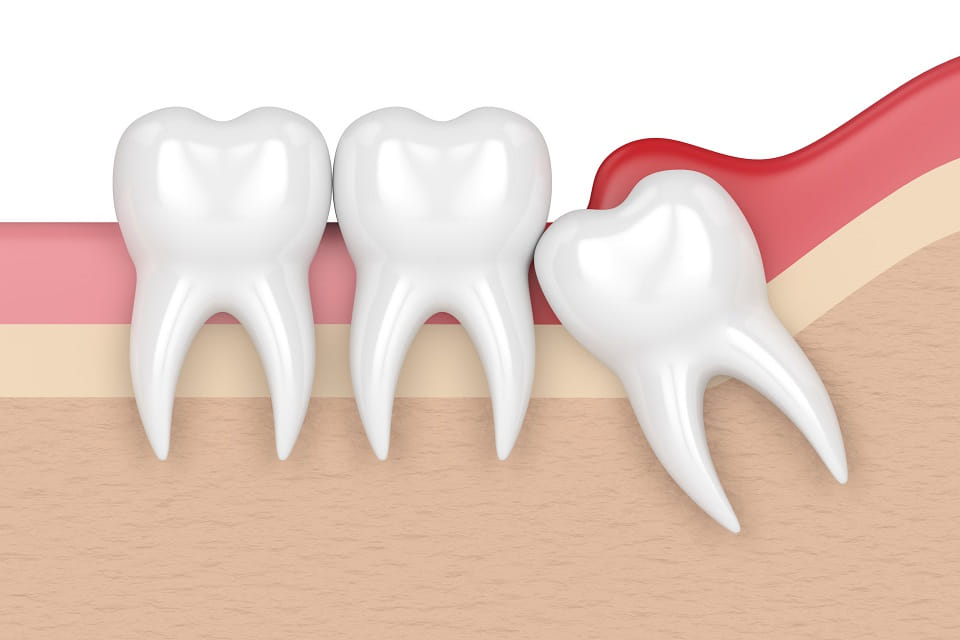As a child, you have milk teeth that eventually fall out to give way to permanent teeth. This is the normal dental development cycle. However, some people grow a third pair of molars in their late teens and early twenties. These are called wisdom teeth.

Wisdom teeth can help you better chew your food; however, this isn’t always the case. Sometimes, wisdom teeth can cause discomfort, gradually worsening into unbearable pain. When that happens, it’s time to see your dentist.
Understanding Wisdom Teeth
Wisdom teeth are molars, the largest teeth in your mouth. Their primary function is assisting with chewing hard foods before swallowing. As mentioned above, wisdom teeth only emerge in a small percentage of the human population – most people don’t have them.
You are likely to experience pain as wisdom teeth emerge, and they frequently need to be removed.
Wisdom Teeth Complications
Wisdom teeth cause more discomfort if there isn’t enough gum room or they emerge in the wrong position. Impaction means your wisdom teeth are trapped inside your jaws or below the gums.
Here are the potential effects of impacted wisdom teeth.
- When wisdom teeth grow in the wrong position, they trap food particles, providing the right conditions for bacterial growth.
- Misalignment makes it difficult to floss between wisdom teeth and the nearby molars.
- The partial emergence of wisdom teeth leaves gaps in the gums. Bacteria can get into these spaces, causing infections. Later, you’ll likely experience swelling, pain, and jaw stiffness.
- Impacted wisdom teeth can form cysts on or near the affected molar. Cysts carry bacteria that damage roots of nearby teeth, destroy jawbone structure, and increase the risk of tooth loss.
Symptoms of Impacted Teeth
Impaction affects every patient differently. However, some common symptoms include pain, damage to neighbouring teeth, and swollen gums. Upon dental evaluation, the dentist will likely discover cysts and tumours, especially if the patient doesn’t get an early diagnosis. If left untreated, impaction leads to gum disease and tooth decay.
FAQs about Wisdom Teeth
Here are frequently asked questions about wisdom teeth.
Can You Get Wisdom Teeth in Your 30s?
Most people get wisdom teeth between 18 and 26. It’s rare to get your wisdom teeth in your 30s. However, it isn’t impossible – remember, people have different genes and lifestyles, which are critical factors in your dental development cycle. The problem with late emergence is the pain, as the gums are likely to be smaller and harder.
Do You Need Wisdom Teeth?
Wisdom teeth are beneficial, but they aren’t a necessity. You can do without them. However, older generations needed wisdom teeth because they didn’t know much about oral healthcare. Wisdom teeth acted as cover for regular teeth in case of tooth loss.
Should You Keep Your Wisdom Teeth?
You can keep your wisdom teeth, provided they don’t cause discomfort. However, you’ll need to monitor them to avoid developing the problems associated with impaction.
Remember, ageing increases the risk of dental complications, including wisdom teeth. If you wish to keep your wisdom teeth, ensure that you visit your dentist regularly.
Side Effects of Removing Wisdom Teeth
You will feel some pain after a dentist removes the impacted teeth. The pain won’t be intense since the doctors administer local anaesthesia before the procedure. Residual bleeding is also common on the first day. To reduce bleeding, please avoid brushing or flossing the affected area – instead, you can rinse your mouth with warm salty water for a couple of minutes.
Final Words
Wisdom teeth make it easier to chew hard foods, but they also cause complications such as discomfort if there isn’t enough room to erupt, pain if they grow into neighbouring teeth and infections if food and bacteria get trapped in hard-to-reach areas. If you notice new growth in your jawbone and pain in the back of your mouth, consult your dentist for further advice.
